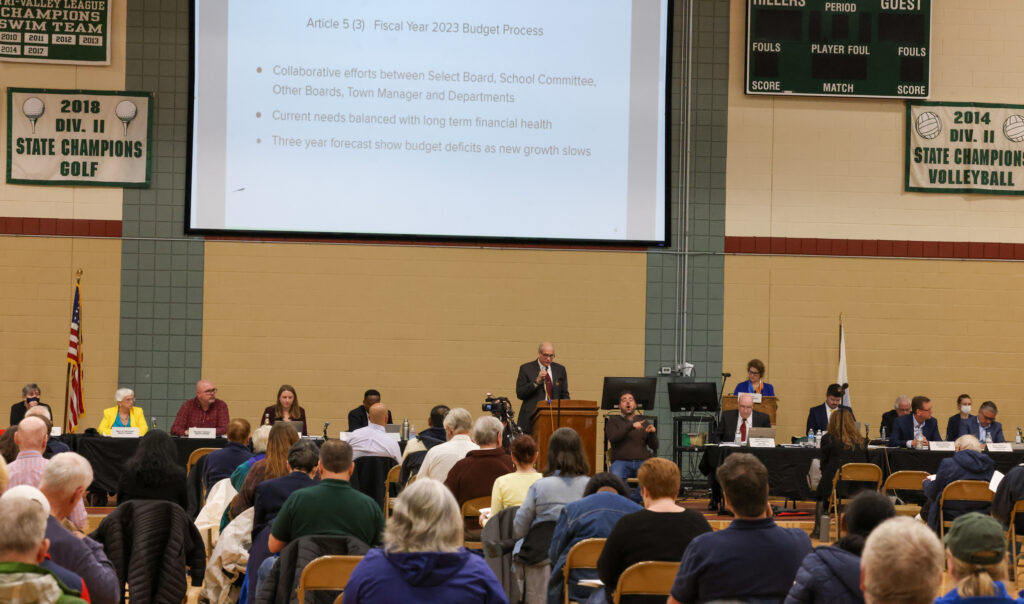
Appropriation Committee Chair Mike Manning discusses the budget at Monday’s Town Meeting. PHOTO/JOHN CARDILLO
The town’s $104 million budget and other financial articles passed easily at Monday’s Annual Town Meeting at the Hopkinton High School Athletic Center, but the meeting was suspended due to lack of a quorum shortly after 10 p.m., just after debate on Articles 22 and 23, which address potential remedies to the town water supply PFAS problem.
Voters were about to vote on Article 22, which would allocate funds for design work regarding the proposed connection to the Massachusetts Water Resource Authority (MWRA) water supply. A few residents questioned if it was the most efficient plan. Department of Public Works Director John Westerling explained that the town has two options after Well 6 off Fruit Street was found to be in violation of the state’s legally allowed levels of PFAS.
“This is an either/or question for us: Either connect to the MWRA or filter our existing sources,” Westerling explained. “Our existing sources are contaminated with iron, manganese and PFAS, so if we connect to the MWRA we will be abandoning or otherwise letting the permitting go for those existing wells.”
According to Westerling, a preliminary estimate for filtration plants for the town’s eight wells (four on Fruit Street, two by Lake Whitehall and two on Alprilla Farm Road) is $44 million. Construction for the connection to the MWRA pipeline (via Southborough) is estimated at $25 million, although Westerling noted there could be additional costs, including the state’s connection fee — which he said the state is considering waiving for towns like Hopkinton that have PFAS issues. There also would be yearly charges from the MWRA for water usage.
Westerling added that the funding source is not yet known, with likely increases in both water rates and taxes. He said the MWRA option should be cheaper in the short term but more expensive in the long run. However, any costs associated with future issues with PFAS or other chemicals would be shared among the MWRA’s 3.1 million users.
Just before the vote was to be held, a resident called for a quorum check. A count tallied 125 voters, three shy of the minimum needed. After a 15-minute recess, attendance dipped to 120 and the meeting was continued to Tuesday, also at 7 p.m. at the high school.
This marks the second year in a row Town Meeting was stopped midway through due to a quorum issue. Last year’s meeting, held outside on the high school football field due to COVID concerns, was continued after a short recess and the appearance of some additional residents who answered the call for more voters to join.
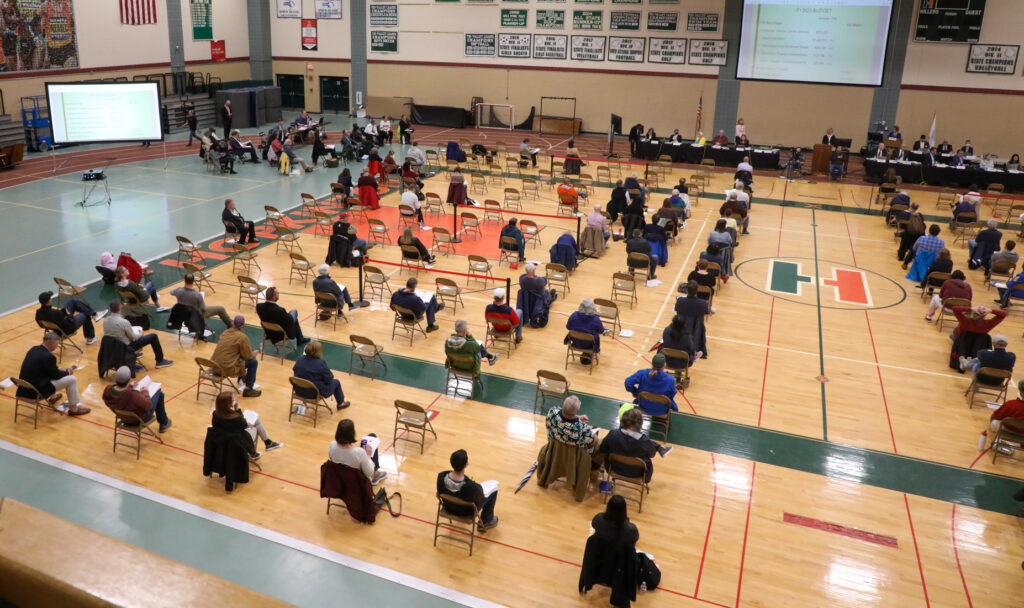
Town Meeting voters listen to a presentation at Monday’s session. PHOTO/JOHN CARDILLO
The budget presentation and discussion lasted about an hour before it passed unanimously.
“One of the town’s core financial principals is to budget in a cautious and prudent way, which means taking a pessimistic view of potential revenue coming in, while also trying to make sure that budgets are able to absorb inflationary cost increases, which are especially hard to predict this year, as energy prices have risen and impacted the cost of many goods and services,” Appropriation Committee Chair Mike Manning explained. “Through a combination of cost containment and some good news on estimated revenues, the proposal before today’s Town Meeting, if approved, will deliver a balanced budget, one that sustains fiscal year 2022 service levels across departments, that pays for contractual and other inflationary cost increases, that continues normal capital spending to renew town facilities and equipment, and that provides for targeted increases in schools and community services.”
Manning said some noteworthy challenges for future budgets are likely to include the potential construction of an Elmwood School replacement plus further expansion to current schools. He also said that if new residential development slows as expected, future budget shortfalls are likely due to the tax impact.
Hopkinton Public Schools Superintendent Carol Cavanaugh stressed that the schools kept the budget tight, coming in at $56,616,428, which is a 4.91 percent increase from the past year. She noted that current enrollment stands at 4,071 students, which is slightly more than was projected.
A town-hired demographer projects 4,745 student for the 2030-31 school year, while the Massachusetts School Building Authority projects 4,975 for 2030-31.
Hopkinton’s per pupil expenditure in 2019 was $15,086, which ranked 31st in the state. In 2020 it was $14,817. Meanwhile, Hopkinton continues to rank among the highest-achieving school systems.
“So you can see that while we are not spending a lot of money on each individual child, we are certainly getting a lot of academic excellence for all of the students who attend the Hopkinton Public Schools,” Cavanaugh said.
Resident Ken Weismantel asked if the budget funds public safety appropriately and if it will allow the town to improve in its retention of police officers.
“Hopkinton is committed to funding public safety,” Town Manager Norman Khumalo answered. “In the budget proposed, public safety funding is going up by approximately 4.3 percent. This increase does not account for projected salary increases that are contained in the compensation contingency. Based on discussions with the police chief, I believe the funding provided for public safety does meet our needs going forward.”
Articles 8, 9 and 10 change the way HCAM is funded and directs the town to allocate $346,947 from free cash to support the cable access channel for the next year, until a new account can be funded via cable franchise fees and other cable-related revenues.
Article 11 deals with rescinding authorized and unissued debt for projects that are no longer necessary or do not require additional funding. Resident Jon Graziano asked why some projects that were approved by Town Meeting voters are not being completed.
Parks & Recreation Commission Chair Dan Terry addressed two of the projects, indicating that a plan to install permanent lighting at the Fruit Street turf fields would have cost far more than anticipated due to infrastructure work, and an indoor athletic facility at Fruit Street was determined to not be feasible.
Following is a list of the articles that were voted on Monday. There are 53 total articles on the warrant.
Article 1, Acceptance of town reports, passed by voice vote (simple majority required)
Article 2, FY 2022 supplemental appropriations and transfers, passed by voice vote (simple majority required)
Article 3, Unpaid bills from prior fiscal years, passed by voice vote (four-fifths majority required)
Article 4, Set the salary of elected officials, passed by voice vote (simple majority required)
Article 5, FY 2023 operating budget, passed by voice vote (simple majority required)
Article 6, Establish shared housing services office revolving fund, passed by voice vote (simple majority required)
Article 7, Revolving funds spending limits, passed by voice vote (simple majority required)
Article 8, Establish access and cable related fund account, passed by voice vote (simple majority required)
Article 9, Public/education/government (PEG) access and cable related fund revolving account funding, passed by voice vote (simple majority required)
Article 10, Revoke HCAM enterprise fund, passed by voice vote (simple majority required)
Article 11, Authorized/unissued debt rescinding, passed by voice vote (simple majority required)
Article 12, Chapter 90 highway funds, passed by voice vote (simple majority required)
Article 13, Authorize petition for special legislation for limited means tested sewer and water user discounts, passed by voice vote (simple majority required)
Article 14, Transfer to other post-employment benefits liability trust fund, passed by voice vote (simple majority required)
Article 15, Transfer to the general stabilization fund, vote to take no action passed by voice vote (simple majority required)
Article 16, Transfer to the capital expense stabilization fund, vote to take no action passed by voice vote (simple majority required)
Article 17, Create school Special Education Reserve Fund, passed by voice vote (simple majority required)
Article 18, Transfer to the school Special Education Reserve Fund, passed by voice vote (simple majority required)
Article 19, Pay-as-you-go capital expenses, passed by voice vote (simple majority required)
Article 20, Water tank cleaning, passed by voice vote (simple majority required)
Article 21, Vehicle replacement, passed by voice vote (simple majority required)


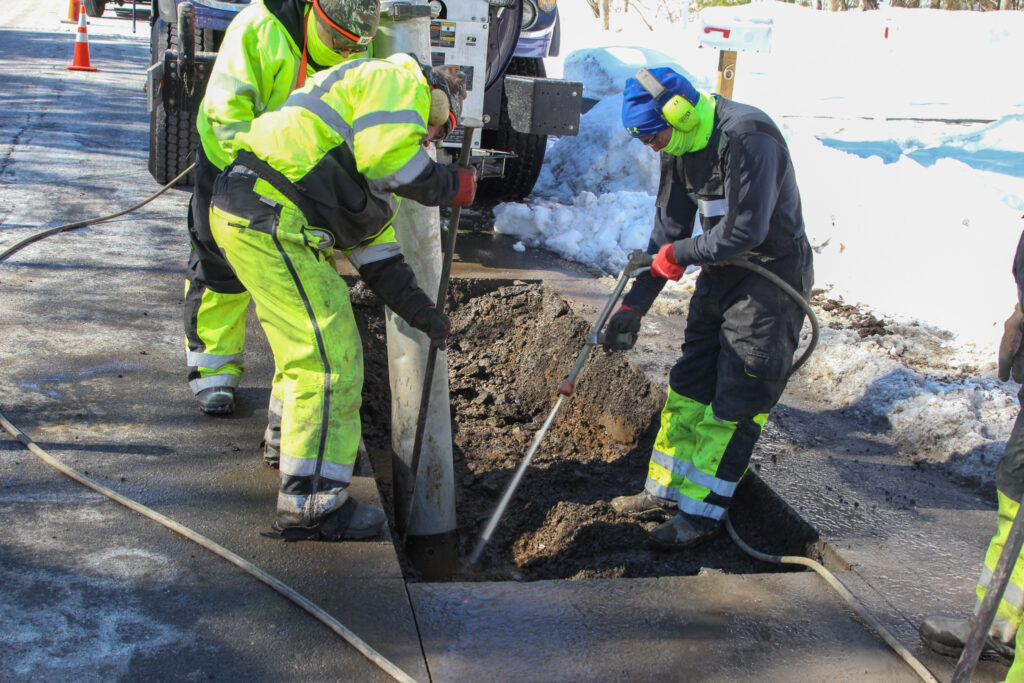
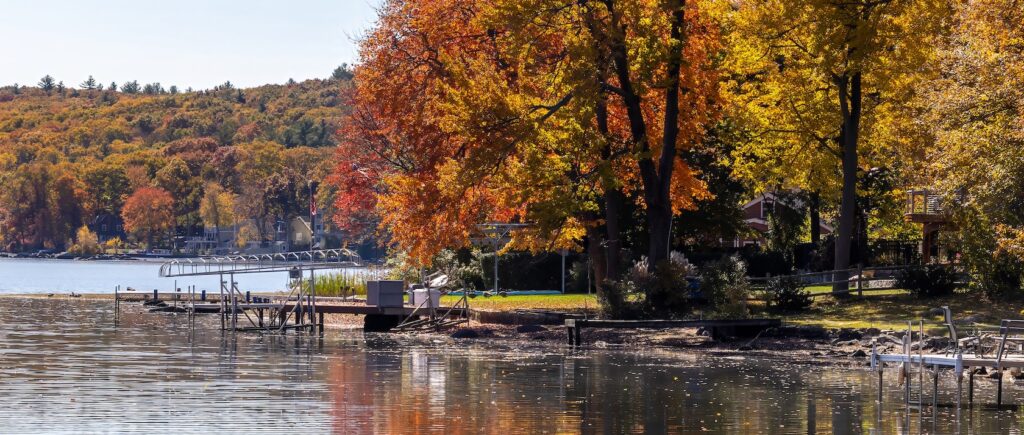
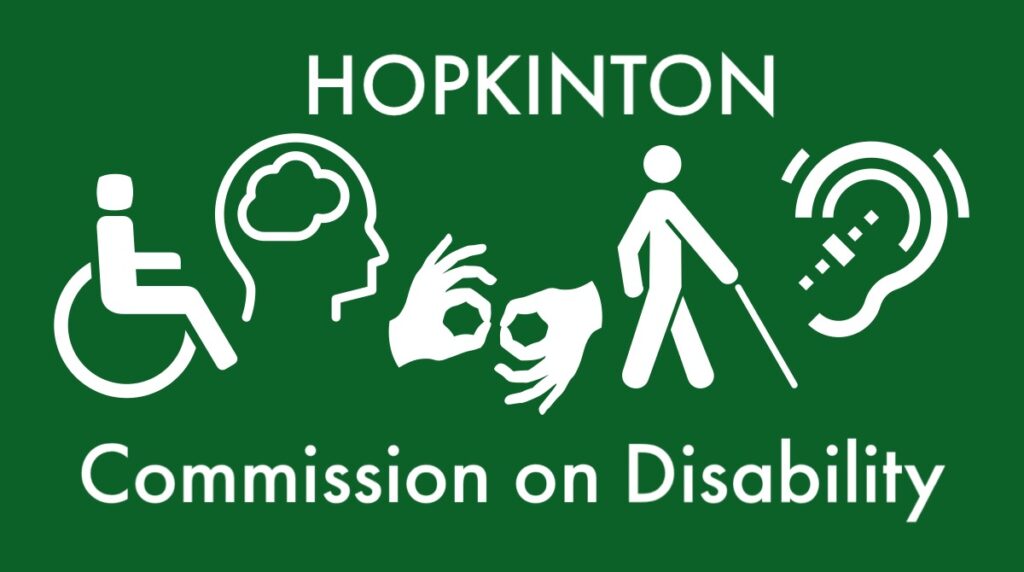
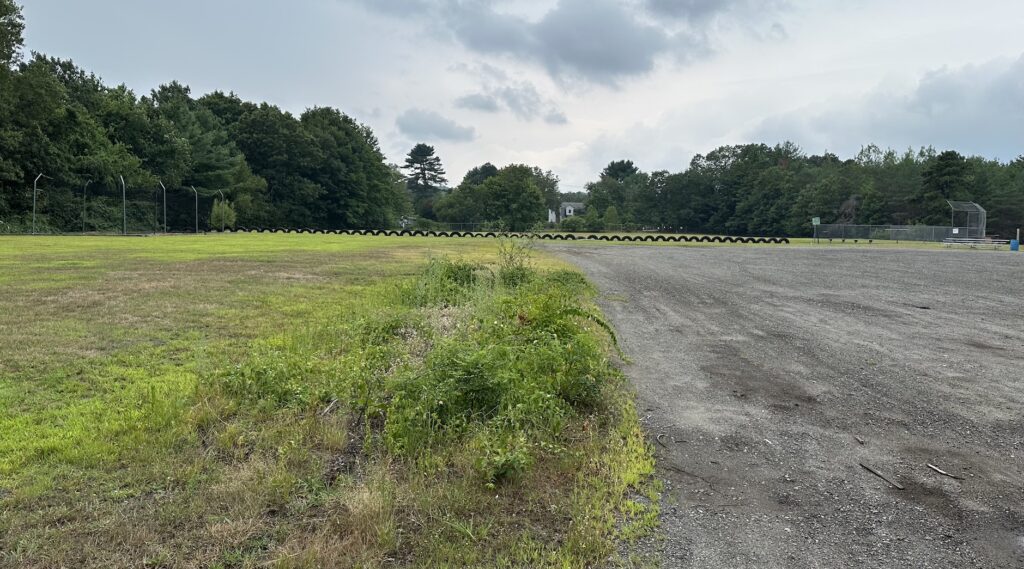
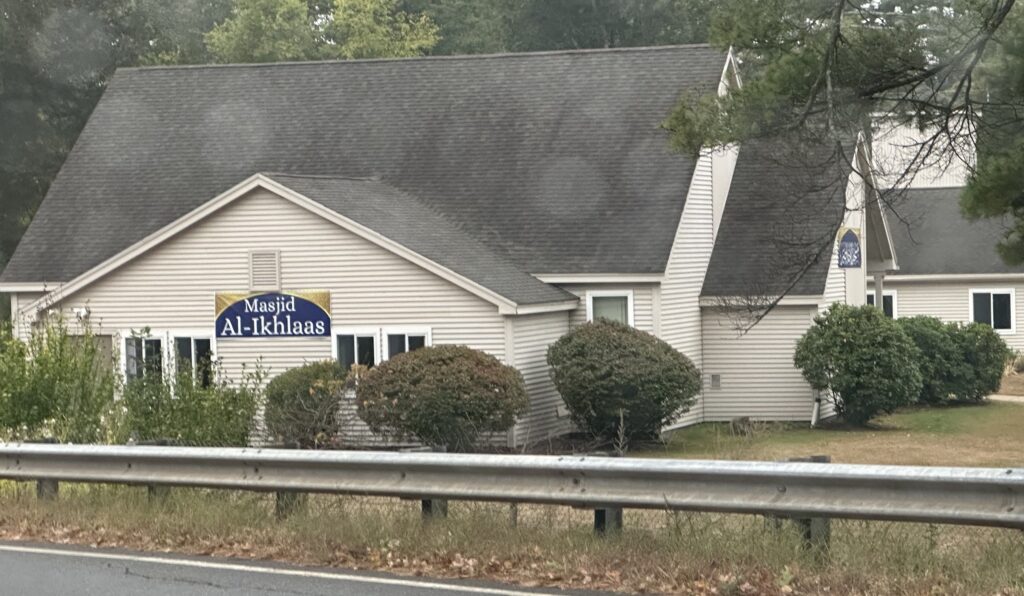














0 Comments